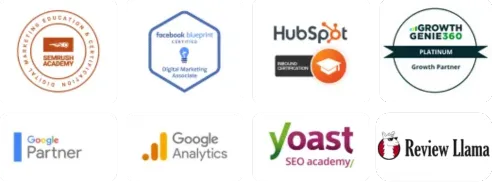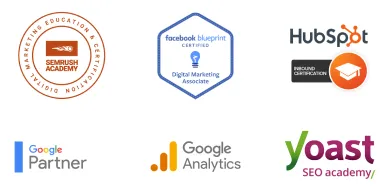TO LEARN IS TO GROW
Learning Center
We do our research and publish our results. Should probably call this the Growing Center.


Real Estate PPC: Discover How to Generate Leads with Your Ad Campaigns
This article explains how a strong branding strategy can help your business compete in the crowded, cutthroat market.
Pay-per-click (PPC) marketing is an incredible tool that can enable you to reach a highly target audience. It can also bring you great returns for your business, provided that you know how to use your customers’ data.
For real estate brokers, PPC can provide them a real competitive edge. First and foremost, it can bring people directly to their website, which gives them more control over how they “say” their sales pitch.
If you’re planning to invest in PPC, you’re in the right place! We’re going to guide you on how you can get started and maximize your returns with paid ads.
PPC Crash Course
PPC is a paid advertising model where the advertiser only pays when people click on their ads. It is a common model which allows the advertiser to put ads mainly in search engines like Google and Bing, although they can also use social media platforms and third-party websites.
It’s easy to spot PPC ads. In Google, they’re the ones that appear before and to the right of the “organic search” results.
(Note: Organic search results are based on the keywords and phrases people type into the search box.)
Aaker believes that the success of branding strategy boils down to meticulous planning and not on the budget itself.
PPC and SEO
Search Engine Optimization (SEO) is usually the best way to put your website on top of search engine results. But with everyone using the same keywords, it has become more difficult for real estate brokers to rank “decently” on Google. Further complicating things is the new trend in which more companies are using paid ads than relying on SEO alone.
While paid ads have their own benefits, they should not replace your SEO strategy. When combined, these marketing tools can help you reach out to more customers and generate more leads.
When used correctly, PPC can help you reach the top of a competitive market where more potential customers may find you. It can also drive brand awareness and help you rank higher on Google.
Three Steps of PPC
The list below explains the three main parts of an effective PPC campaign.
Getting to Know Your Market
You cannot create an effective PPC campaign without first identifying your target customers. In addition, you must identify the areas you want to target and the home designs you wish to sell. Knowing these things is essential because it will narrow down a lot of things for you. After all, it is a waste of money to start a “diluted” campaign that won’t reach your specific target.
Using the above mentioned information, you can now start with your keyword research. Like in SEO, keywords and phrases are important in PPC because they target the most qualified customers.
The key to finding out the best keywords is to understand your target audience.
What does my customer profile look like?
What information could my potential customers need?
How do my customers search for this information?
Where in the buyer cycle could my customers be?
Once you’ve listed your keywords and key phrases, you have to whittle them down to make sure you’ll only use the most relevant ones to your audience on your landing pages.
Capturing and Tracking Leads
Getting the right traffic is important, but if you’re not generating leads, you’re only paying for visitors who have no intention of buying.
When you start your PPC campaigns, don’t expect to sell homes right away. Remember, every marketing campaign involves a long-term process that requires capturing leads, tracking them, and following up to keep a consistent lead flow.
Meanwhile, lead capturing is a method wherein you collect a potential customer’s contact information to generate leads. One way to do this is to create a popup that appears after a visitor has viewed a couple of home listings on your site.
On the other hand, lead tracking is the process of documenting customer information based on their actions. It gives insight into each prospect’s likelihood of closing a deal and the volume of leads in each stage of the sales cycle.
You can use plenty of platforms to capture and track leads, such as Kunversion and Zoho.
The information you get from lead capturing allows you to build an email marketing list.
Following Up
When following up on your leads, you need to be helpful and not intrusive and pushy. Yes, you want to close deals, but you wouldn’t want to scare off your prospects by coming too strongly on them.
Before you start running your PPC campaign, you must establish a detailed plan on how to follow up on your leads. For example, if you are working with agents, having detailed steps of who will contact the leads, when, and how they’re going to do it can eliminate the risk of duplication and gaffe.
Another effective way to follow up on your leads is to launch an email drip campaign using the email marketing list you’ve built. This allows you to ask your potential clients if they want to schedule an appointment to discuss their needs.
Here are some pointers for lead follow up:
Respond promptly
Personalize your communication
Use different communication channels
Follow a schedule
Learn to identify and abandon lost causes
Real Estate PPC Strategies
1. Bid on your brand terms
You can’t disregard the name of your business or brand in your keyword strategy. After all, you never know when people might search for your business’s name after learning it from Craigslist, a friend, or an outdoor sign outside your office. Also, prospects who search for your name are more likely to convert to high-quality leads, while competitors may bid on your name and steal your leads by appearing above your organic listing.
2. Use geo-targeting
Real estate brokers are highly dependent on their location, making them perfect for Google Ad’s geo-targeting feature.
Google Ads’ geo-targeting handles the localization problem and removes ad appearances in irrelevant locations. With geo-targeting, you can create highly targeted and customized campaigns in your target area.
3. Consider negative keywords
Negative keywords are search phrases that will prevent your ad from showing up. You can use these if you don’t want to deal with certain types of properties or homes and when you want to exclude unwanted locations.
4. Use best keyword match type
Google Ads has different match types for each target keyword, including “Broad Match” which is the default mode. It delivers maximum exposure but low-quality traffic, which is not ideal for real estate lead generation.
The best match types you can use are the Phrase Match and Exact Match; using them allows you to generate quality leads with minimum acquisition cost, just make sure that you include the location, property type, and offer in your target keyphrase.
Conclusion
PPC campaign’s effectiveness boils down to its flexibility: You can adjust and change them based on the data of your customers or even stop campaigns that are not providing results.
Built for Growth. Backed by 25 Years of Trust.
For over two decades, LOJO has been a trusted partner to hundreds of businesses just like yours. Whether working directly with owners, managers, teams, or boards of directors, our goal remains the same: to be a reliable and results-driven asset to your business.
Over the years, we’ve carefully built a team of experts—each selected for their unique skills, strengths, and personalities. Our clients choose LOJO because they know we genuinely care about their success.
And after 25 years of helping businesses grow, we’re more committed than ever.


Built for Growth. Backed by 25 Years of Trust.
For over two decades, LOJO has been a trusted partner to hundreds of businesses just like yours. Whether working directly with owners, managers, teams, or boards of directors, our goal remains the same: to be a reliable and results-driven asset to your business.
Over the years, we’ve carefully built a team of experts—each selected for their unique skills, strengths, and personalities. Our clients choose LOJO because they know we genuinely care about their success.
And after 25 years of helping businesses grow, we’re more committed than ever.




Matthew Rogers, President
iProspect Check
After spending several months reviewing multiple proposals from several different companies we engaged LOJO to develop a new website that represents our company effectively. We worked initially with Stephen Platte who helped create the scope of the project. Stephen was knowledgeable and always followed up with me on time and as promised.
He "closed the deal" for LOJO with his professionalism, service orientation and easy going approach. Once we signed the contract we were introduced to Jay Kelly who would be the creative lead for LOJO. This was the most challenging part of the project for my company, as there was no shortage of ideas from our side. Jay managed the project flawlessly, and once we had all agreed to the design, Jay introduced us to Eric.
Eric Lay is one of the founders of LOJO. Eric took the design we had developed and brought it to life. We delivered content as quickly as he requested it. Eric kept the project on task and we responded by exceeding every deadline for content. In turn, once provided, literally not a day went by that Eric didn't add the content and take the next step. In just a few weeks we launched our new website. Eric is a pleasure to work with.
His positive attitude and consultative approach really enhanced the experience and made a big difference for us in the outcome of our project. We would welcome you to visit our website to take a look at the quality work of LOJO. We are very pleased with LOJO and look forward to working with them in the future as we pursue an aggressive SEO strategy."
After spending several months reviewing multiple proposals from several different companies we engaged LOJO to develop a new website that represents our company effectively. We worked initially with Stephen Platte who helped create the scope of the project. Stephen was knowledgeable and always followed up with me on time and as promised.
He "closed the deal" for LOJO with his professionalism, service orientation and easy going approach. Once we signed the contract we were introduced to Jay Kelly who would be the creative lead for LOJO. This was the most challenging part of the project for my company, as there was no shortage of ideas from our side. Jay managed the project flawlessly, and once we had all agreed to the design, Jay introduced us to Eric.
Eric Lay is one of the founders of LOJO. Eric took the design we had developed and brought it to life. We delivered content as quickly as he requested it. Eric kept the project on task and we responded by exceeding every deadline for content. In turn, once provided, literally not a day went by that Eric didn't add the content and take the next step. In just a few weeks we launched our new website. Eric is a pleasure to work with.
His positive attitude and consultative approach really enhanced the experience and made a big difference for us in the outcome of our project. We would welcome you to visit our website to take a look at the quality work of LOJO. We are very pleased with LOJO and look forward to working with them in the future as we pursue an aggressive SEO strategy."

Matthew Rogers, President
iProspect Check
The team at LOJO were wonderful to work with. They are well organized and very patient as we worked through our marketing strategy and developed a well thought out and clear action plan at a reasonable price. We will definitely be back for our future campaign needs."

Jon Crosby, Founder
Dazil

